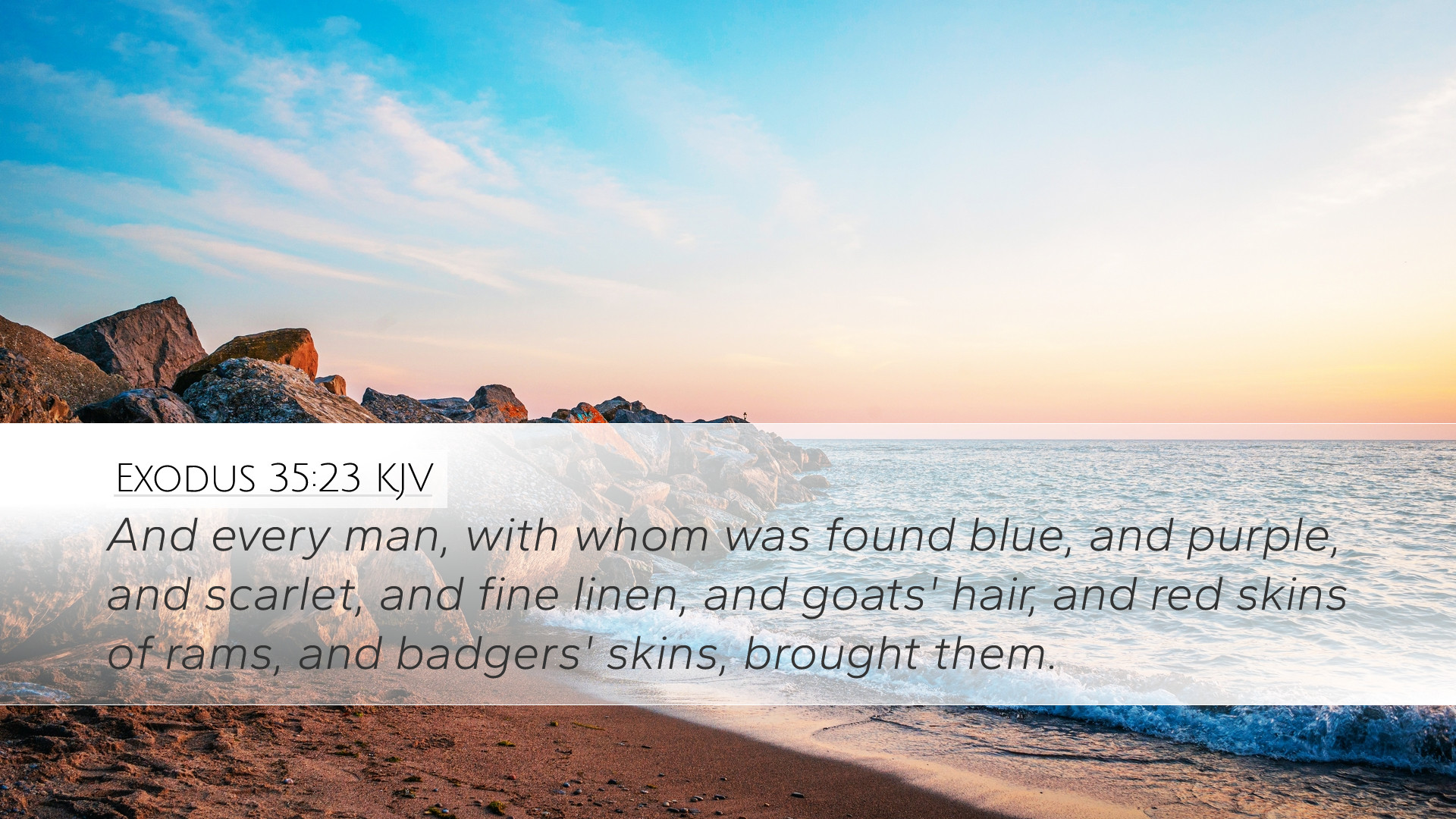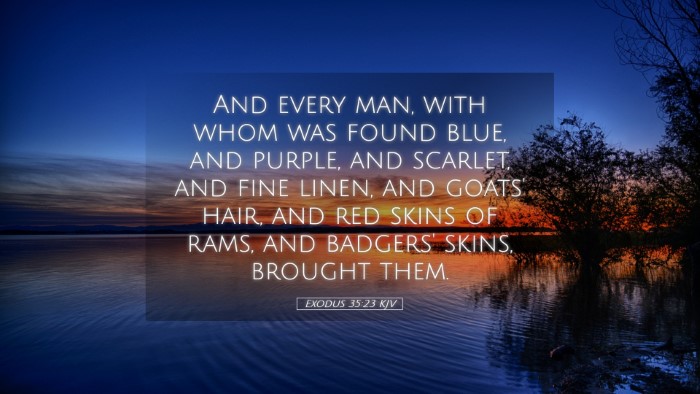Exodus 35:23: "And every one that did offer an offering of silver and brass brought the Lord's offering: and every man, with whom was found shittim wood for any work of the service, brought it."
The significance of this verse lies in the communal effort and individual dedication to the service of the Lord in the construction of the Tabernacle. It highlights the intricate balance between communal contributions and personal commitment in the life of Israel as they prepared for worship.
Contextual Overview
This verse is set within the broader narrative of the Israelites in the wilderness, as they prepare to build the Tabernacle, a dwelling place for God among them. The preceding chapters detail God’s instructions and the types of materials needed for this sacred project.
Matthew Henry’s Insights
Henry emphasizes the unity of Israelite efforts, noting that the offerings were not merely transactions but an act of worship. The community's readiness to contribute silver, brass, and the acacia wood (shittim wood) reflects their desire to glorify God through tangible means. Henry stresses the importance of voluntary offerings, indicating that true service to God arises from a willing heart.
Key Points from Henry:
- Voluntary Nature of Offerings: Each person brought what was in their heart, indicating a personal commitment to God.
- Community Participation: The variety of contributions illustrates the collective responsibility of Israel to support the work of God.
- Symbolic Materials: Silver and brass have significant meanings in biblical offerings, representing purity and sacrifice, while shittim wood denotes durability and longevity in God’s purpose.
Albert Barnes’ Commentary
Barnes provides a robust explanation of the materials mentioned. He notes that the shittim wood (or acacia wood) was not only plentiful in the region but served a significant role in the construction of the Tabernacle, symbolizing God's provision and endurance. He elaborates on the significance of each contribution, suggesting that the individual act of giving was reflective of the individual’s relationship with God.
Key Observations from Barnes:
- Distinct Materials: Each material brought forward for the Tabernacle had specific purposes and qualities, emphasizing the order and special nature of God’s dwelling place.
- Spiritual Reflection: The act of giving silver and brass, often associated with wealth, implies that spiritual richness starts with giving oneself to God's service.
- Preparation for Worship: The careful selection and offering of materials became a preparatory act for worship, setting the tone for Israel's relationship with God.
Adam Clarke's Commentary
Clarke's perspective highlights the practicalities and logistics involved in building the Tabernacle. He notes that the phrase 'with whom was found' implies that the materials were integral to the community's life, and many had been prepared in advance for this purpose. His analysis also touches on the underlying themes of obedience and reliance upon God’s provision.
Insights from Clarke:
- Selectivity in Offering: Clarke notes the meticulous nature of the offerings, which suggests that believers must discern what they bring before the Lord.
- Unity in Purpose: The gathering of materials reflects a shared mission, encouraging communal bonds while pursuing divine service.
- God's Faithfulness: The knowledge that materials were found and brought forth implies an acknowledgment of God’s faithful provision for the work He ordained.
Theological Reflections
From a theological perspective, Exodus 35:23 invites a deeper contemplation of the nature of offerings, both in the Old Testament and in contemporary worship. The act of giving, inspired by the heart, stands at the forefront of true worship, suggesting that God desires not only the materials but the attitude of the giver.
Moreover, this verse compels modern-day believers to consider how they contribute to the life of the Church—spiritually, materially, and relationally. The unity shown by the Israelites serves as an example for congregations today, illustrating the power of collective service rooted in individual commitment.
Practical Applications for Ministry
Pastors, students, and theologians can derive several practical applications from this verse and its commentaries:
- Encouraging Generosity: Like the Israelites, encourage congregants to give from their hearts, emphasizing voluntary giving as an integral part of worship.
- Emphasizing Unity: Foster a spirit of collaboration among church members, reminding them of their individual contributions to the collective mission.
- Teaching about Offerings: Use this verse to educate about the significance of offerings in the life of faith, connecting it to both historical and current contexts.
Conclusion
Exodus 35:23 serves as a rich source of insight into the nature of worship through offerings and the importance of individual and communal participation in the work of God. By synthesizing insights from esteemed commentaries, we recognize the depth of this biblical text and its relevance to our lives and ministries today. This shared experience of faith, sacrificial generosity, and obedience continues to resonate in the heart of Christian worship, demonstrating the timeless call to serve God with our best.


